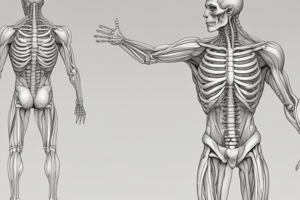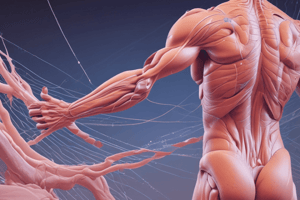Podcast
Questions and Answers
What is the most common systemic disease affecting the spine?
What is the most common systemic disease affecting the spine?
- Osteoporosis
- Cancer (correct)
- Infection
- Arthritis
A patient presents with back pain and has a history of cancer. What should the practitioner consider?
A patient presents with back pain and has a history of cancer. What should the practitioner consider?
- Cancer until proven otherwise (correct)
- Infection or inflammation
- Musculoskeletal imbalance
- Other possible causes of back pain
What is the likelihood that a patient with a malignant spinal neoplasm is over 50 years old?
What is the likelihood that a patient with a malignant spinal neoplasm is over 50 years old?
- 90%
- 70%
- 80% (correct)
- 60%
What is a highly sensitive test good at?
What is a highly sensitive test good at?
What is a highly specific test good at?
What is a highly specific test good at?
What is the significance of a patient's pain not being relieved by bed rest?
What is the significance of a patient's pain not being relieved by bed rest?
What is the age below which cancer is not identified in patients with back pain?
What is the age below which cancer is not identified in patients with back pain?
What is an absolute contraindication for HVLA adjusting?
What is an absolute contraindication for HVLA adjusting?
What is the primary purpose of considering cancer until proven otherwise in a patient with a history of cancer?
What is the primary purpose of considering cancer until proven otherwise in a patient with a history of cancer?
What is the significance of unexplained weight loss in a patient with back pain?
What is the significance of unexplained weight loss in a patient with back pain?
Which of the following is an absolute contraindication to HVLA that may cause radiculopathy?
Which of the following is an absolute contraindication to HVLA that may cause radiculopathy?
What is the primary purpose of EMG/NCV nerve testing in lumbar radiculopathy?
What is the primary purpose of EMG/NCV nerve testing in lumbar radiculopathy?
Which of the following is a characteristic of L4 radiculopathy?
Which of the following is a characteristic of L4 radiculopathy?
What is the term for a group of muscles stimulated by a single spinal nerve?
What is the term for a group of muscles stimulated by a single spinal nerve?
Which of the following is a surgical indication for lumbar radiculopathy?
Which of the following is a surgical indication for lumbar radiculopathy?
What is the term for narrowing of the lateral recesses of the spinal canal?
What is the term for narrowing of the lateral recesses of the spinal canal?
Which of the following muscles is stimulated by the C5 spinal nerve?
Which of the following muscles is stimulated by the C5 spinal nerve?
Which of the following is a characteristic of sciatica?
Which of the following is a characteristic of sciatica?
What is the primary concern when diagnosing musculo-ligamentous injuries?
What is the primary concern when diagnosing musculo-ligamentous injuries?
What is the typical duration of onset of musculo-ligamentous injuries after trauma?
What is the typical duration of onset of musculo-ligamentous injuries after trauma?
What is the primary reason for ordering X-rays in musculo-ligamentous injuries?
What is the primary reason for ordering X-rays in musculo-ligamentous injuries?
What is the contraindication for HVLA in musculo-ligamentous injuries?
What is the contraindication for HVLA in musculo-ligamentous injuries?
What is the primary goal of gentle stretching and exercise in musculo-ligamentous injuries?
What is the primary goal of gentle stretching and exercise in musculo-ligamentous injuries?
What is the typical referral pattern for facet pain?
What is the typical referral pattern for facet pain?
What is the primary cause of nerve root irritation in disc degeneration?
What is the primary cause of nerve root irritation in disc degeneration?
What is the term for the inflammatory response caused by viral infection in nerve root irritation?
What is the term for the inflammatory response caused by viral infection in nerve root irritation?
What is the incidence of LBP caused by spinal infection?
What is the incidence of LBP caused by spinal infection?
What is the significance of the presence of fever in a patient with suspected spinal infection?
What is the significance of the presence of fever in a patient with suspected spinal infection?
What is the significance of the acronym 'SPIN' in the context of spinal infections?
What is the significance of the acronym 'SPIN' in the context of spinal infections?
What is the significance of the acronym 'SNOUT' in the context of spinal infections?
What is the significance of the acronym 'SNOUT' in the context of spinal infections?
What is a common risk factor for compression fractures?
What is a common risk factor for compression fractures?
What is the significance of a patient being over 70 years old in the context of compression fractures?
What is the significance of a patient being over 70 years old in the context of compression fractures?
What is the significance of long-term corticosteroid usage in the context of compression fractures?
What is the significance of long-term corticosteroid usage in the context of compression fractures?
What is the significance of a history of trauma in the context of compression fractures?
What is the significance of a history of trauma in the context of compression fractures?
What is the specificity of the 'Yes + LBP' test for compression fracture?
What is the specificity of the 'Yes + LBP' test for compression fracture?
What is the purpose of the 5 screening questions for Ankylosing Spondylitis?
What is the purpose of the 5 screening questions for Ankylosing Spondylitis?
What is the significance of a positive screening test result for Ankylosing Spondylitis?
What is the significance of a positive screening test result for Ankylosing Spondylitis?
What is the limitation of the Schober test in the physical examination of Ankylosing Spondylitis?
What is the limitation of the Schober test in the physical examination of Ankylosing Spondylitis?
What is the significance of the spinal ROM in the physical examination of Ankylosing Spondylitis?
What is the significance of the spinal ROM in the physical examination of Ankylosing Spondylitis?
What is a cause of neurologic compromise in patients with low back pain?
What is a cause of neurologic compromise in patients with low back pain?
What is the primary function of the lumbar area?
What is the primary function of the lumbar area?
Which of the following conditions is NOT a cause of low back pain?
Which of the following conditions is NOT a cause of low back pain?
What is the significance of a patient's history of cancer in the context of low back pain?
What is the significance of a patient's history of cancer in the context of low back pain?
What is the primary purpose of considering red flags in a patient's history?
What is the primary purpose of considering red flags in a patient's history?
What is the characteristic of lumbar strain/sprain?
What is the characteristic of lumbar strain/sprain?
What is the significance of unexplained weight loss in a patient with low back pain?
What is the significance of unexplained weight loss in a patient with low back pain?
What is a symptom that is not typically experienced with mechanical back pain, but may indicate a more serious underlying condition?
What is a symptom that is not typically experienced with mechanical back pain, but may indicate a more serious underlying condition?
What is the prevalence of malignant neoplasm of the spine as a cause of low back pain?
What is the prevalence of malignant neoplasm of the spine as a cause of low back pain?
What is the primary purpose of assessing motor, reflex, and sensory function in diagnosing the causes of low back pain?
What is the primary purpose of assessing motor, reflex, and sensory function in diagnosing the causes of low back pain?
What is the term for the phenomenon where social/psychological stress can amplify or prolong pain?
What is the term for the phenomenon where social/psychological stress can amplify or prolong pain?
What is the significance of finding at least 3 out of 5 categories of inappropriate/non-organic signs in a patient with low back pain?
What is the significance of finding at least 3 out of 5 categories of inappropriate/non-organic signs in a patient with low back pain?
What is the primary purpose of considering evidence of social/psychological distress in diagnosing the causes of low back pain?
What is the primary purpose of considering evidence of social/psychological distress in diagnosing the causes of low back pain?
What is the term for the inflammatory response caused by viral infection in nerve root irritation?
What is the term for the inflammatory response caused by viral infection in nerve root irritation?
What is the significance of a patient presenting with a sudden onset of severe abdominal/back pain?
What is the significance of a patient presenting with a sudden onset of severe abdominal/back pain?
Which of the following anatomic anomalies is an absolute contraindication to HVLA adjusting?
Which of the following anatomic anomalies is an absolute contraindication to HVLA adjusting?
A patient presents with low back pain and has a history of gallstones. What is the likelihood that the back pain is referred from the gallbladder?
A patient presents with low back pain and has a history of gallstones. What is the likelihood that the back pain is referred from the gallbladder?
Which of the following visceral diseases can cause sharp, referred low back pain?
Which of the following visceral diseases can cause sharp, referred low back pain?
What is the primary concern when evaluating a patient with back pain and a history of cancer?
What is the primary concern when evaluating a patient with back pain and a history of cancer?
Which of the following anatomic anomalies can cause relative contraindications or no contraindications to HVLA adjusting?
Which of the following anatomic anomalies can cause relative contraindications or no contraindications to HVLA adjusting?
What is the primary reason for evaluating anatomic anomalies in patients with low back pain?
What is the primary reason for evaluating anatomic anomalies in patients with low back pain?
What is the primary reason for considering cancer until proven otherwise in a patient with a history of cancer?
What is the primary reason for considering cancer until proven otherwise in a patient with a history of cancer?
What is the significance of a patient's pain not being relieved by bed rest in the context of cancer?
What is the significance of a patient's pain not being relieved by bed rest in the context of cancer?
What is the primary purpose of patient history in detecting underlying cancer?
What is the primary purpose of patient history in detecting underlying cancer?
What is the sensitivity of the test combining the patient being younger than 50 years and having no history of cancer, unexplained weight loss, or failure of conservative therapy?
What is the sensitivity of the test combining the patient being younger than 50 years and having no history of cancer, unexplained weight loss, or failure of conservative therapy?
What is the primary purpose of the WHO Guidelines list of absolute contraindications for HVLA adjusting?
What is the primary purpose of the WHO Guidelines list of absolute contraindications for HVLA adjusting?
What is the significance of the presence of fever in a patient with suspected spinal infection?
What is the significance of the presence of fever in a patient with suspected spinal infection?
What is the term for narrowing of the lateral recesses of the spinal canal?
What is the term for narrowing of the lateral recesses of the spinal canal?
What is the primary purpose of gentle stretching and exercise in musculo-ligamentous injuries?
What is the primary purpose of gentle stretching and exercise in musculo-ligamentous injuries?
What is the significance of a patient being over 70 years old in the context of compression fractures?
What is the significance of a patient being over 70 years old in the context of compression fractures?
What is the significance of the acronym 'SNOUT' in the context of spinal infections?
What is the significance of the acronym 'SNOUT' in the context of spinal infections?
What is the main reason why the 'Yes + LBP' test is not used as a diagnostic tool for compression fractures?
What is the main reason why the 'Yes + LBP' test is not used as a diagnostic tool for compression fractures?
What is the primary purpose of the 5 screening questions for Ankylosing Spondylitis?
What is the primary purpose of the 5 screening questions for Ankylosing Spondylitis?
What is the limitation of the Schober test in the physical examination of Ankylosing Spondylitis?
What is the limitation of the Schober test in the physical examination of Ankylosing Spondylitis?
What is the significance of a positive screening test result for Ankylosing Spondylitis?
What is the significance of a positive screening test result for Ankylosing Spondylitis?
What is the main purpose of assessing spinal ROM in the physical examination of Ankylosing Spondylitis?
What is the main purpose of assessing spinal ROM in the physical examination of Ankylosing Spondylitis?
What is a common cause of neurologic compromise in patients with low back pain?
What is a common cause of neurologic compromise in patients with low back pain?
Flashcards are hidden until you start studying
Study Notes
Musculo-Ligamentous Injuries
- Low back pain due to soft tissue injury:
- Local pain on palpation (mild to severe)
- No paresthesia (exceptions)
- No muscle weakness in legs or feet
- Paraspinal muscle spasm (may be excruciating)
- Relieved by rest, exacerbated by motion
- May begin immediately or gradually after trauma (usually within 24 hours)
- Diagnosis based on mechanism of injury (MOI), location of pain, and exclusion of nervous system injury and other systemic diseases
Chiropractic Care
- HVLA (high-velocity, low-amplitude) may be contraindicated if severe/acute
- Limiting motion decreases muscle strength, flexibility, and circulation
- Gentle stretching and exercise preferred treatment to increase circulation and facilitate healing
IVD and Facet Degeneration
- May cause radiating pain if degeneration causes nerve root impingement
- IVD bulging/herniated into IVF (intervertebral foramen)
- Facet hypertrophy (severe expanding into IVF)
- Facet pain referral to:
- Buttocks and posterior thighs
Nerve Root Irritation
- Direct compression (mechanical pressure)
- Disc degeneration/Lumbar radiculopathy (usually unilateral)
- Bony encroachment (arthritic hypertrophy, spondylolisthesis, spinal stenosis)
- Chemical changes:
- Nucleus pulposus inflammatory to nerve roots
- Neuroischemia (spinal stenosis)
- Viral infection:
- Causes inflammation of the nerves
Lumbar Radiculopathy
- Pathology of a lumbar nerve root
- Herniated disc (degeneration, trauma, or both)
- Facet arthritis/bone spurs
- Spondylolisthesis
- Absolute contraindications to HVLA:
- Spinal cord or meningeal tumors and cysts
- Hematomas (cord or spinal canal)
- Spinal malignancies
- Aggressive benign tumors
- Need to determine level involved:
- Patient history
- EMG/NCV nerve testing
- Surgery may be necessary:
- Unrelenting pain
- Severe functional impairment
- Incontinence (CES-SURGICAL EMERGENCY)
Radiating Pain and Dermatomal Patterns
- Sciatica (S1-S5):
- Buttocks → posterior legs → lateral ankles
- L5:
- Postero-lateral thighs wrapping around to the anterior foreleg
- L4:
- Lateral-anterior thighs wrapping around to antero-medial foreleg
Myotomes and Muscle Strength Testing
- Myotome: group of muscles stimulated by a single spinal nerve
- Upper extremities:
- C5: Deltoid and Biceps (C6 too)
- C6: Wrist Extensors
- C7: Triceps/Wrist Flexors/Finger Extensors
- C8: Finger Flexors
- T1: Finger Abduction/Finger Adduction
- Lower extremities:
- L3: Hip Flexors
- L4: Knee Extensors
- L5: Knee Flexors
- S1: Plantar Flexors
Spinal Stenosis
- Central Canal Stenosis: narrowing of the central spinal canal
- Foraminal Stenosis (lateral): narrowing of the lateral recesses of the spinal canal
Cancer Red Flags
- Patient history:
- History of cancer
- Unexplained weight loss
- Pain lasting longer than one month
- Pain not relieved by bed rest
- Specificity and sensitivity:
- Highly sensitive test: more likely a – test is really – for a condition
- Highly specific test: more likely + test is really + for condition
- Cancer summary:
- Patient history is most useful in detecting underlying cancer
- >50 yoa
- History of cancer
- Unexplained weight loss
- Pain > one month
- Pain not improved by conservative therapy
- Pain not relieved by bed rest
Absolute Contraindications
- WHO Guidelines list of absolute contraindications for HVLA adjusting:
- Some anomalies
- Acute fracture
- Acute infection
- Spinal malignancies
- Hematomas (cord or canal)
- Frank disc herniation with accompanying signs of progressive neurological deficit
Spinal Infections
- Acute spinal infections are absolute contraindications to HVLA thrusts
- LBP caused by spinal infection – incidence 0.01%
- Usually bloodborne
- Presence of fever: high specificity (SPIN)
Compression Fractures
- Red Flags:
- Osteoporosis
- Corticosteroid usage
- >70 yoa
- >50 yoa
- History of trauma
- Specificity = positive rules in
- Patient > 70 yoa? Yes + LBP = 96% specific for compression fracture
- Patient > 50 yoa? Yes + LBP = 61% specific for compression fracture
- Long-term corticosteroid usage? - very high specificity (0.99)
- Is there a history of trauma? Yes + LBP = 85% specific for compression fracture
Ankylosing Spondylitis
- 5 screening questions for AS:
- Morning stiffness?
- Discomfort improves with exercise?
- Onset before 40 yoa?
- Did symptoms begin slowly?
- Has the pain persisted for a minimum of 3 months?
- If the pt answers ‘yes’ to at least 4/5 of the screening questions → + for AS
- Predictive value of a + screening test is typically low for very rare conditions
- Sensitivity and specificity vary from one study to another
Evidence of Neurologic Compromise
- Causes of neurologic compromise:
- Herniated disc may compromise neurological structures
- Cauda equina
- Spinal cord
- Nerve root
Low Back Pain: General Information
- The low back (lumbar area) provides structural support, movement, and protection of certain body tissues.
- Pain in the low back can result from conditions affecting the bony lumbar spine, intervertebral discs, ligaments, spinal cord/nerves, lumbar musculature, internal organs, and skin.
Origins of Low Back Pain
- Anatomic and physiologic causes:
- Musculoligamentous injuries
- Degenerative changes in intervertebral discs (IVD) and facets
- IVD herniation with nerve root irritation
- Spinal stenosis
- Anatomic anomalies
- Underlying systemic disease
- Visceral disease
- Red flags for low back pain:
- Unsteady when standing or walking
- Difficulties passing/controlling bladder or bowels or numbness in either area
- Previous history of cancer or osteoporosis
- Back pain accompanied by unexplained weight loss or fever
- Bleeding disorder
Musculo-Ligamentous Injuries
- Lumbar strain/sprain (acute/chronic):
- One of the most common causes of low back pain
- May present with compensatory hypolordosis
- Can result from hypertrophic degenerative changes
Anatomic Anomalies
- Absolute or relative contraindications:
- Dens hypoplasia, unstable os odontoideum, basilar invagination, Arnold Chiari, etc.
- Most lumbopelvic anomalies cause relative contraindications or none
- Scoliosis – asymptomatic or symptomatic (severe)
- Spondylolisthesis - asymptomatic or symptomatic (severe)
Systemic Disease
- Causes of low back pain:
- Cancer – primary or metastatic
- Spinal infections
- Ankylosing spondylitis
Visceral Diseases
- May refer pain to the low back from abdominal and pelvic organs:
- Bowel/bladder
- Uterus/ovaries and prostate
- Kidneys
- GI (gallbladder, aorta, etc.)
- Lymph nodes/tissue
Prevalence of Diseases Causing Low Back Pain
- Compression fractures: 4%
- Spondylolisthesis: 3%
- Malignant neoplasm of the spine: 0.7%
- Ankylosing spondylitis: 0.3%
- Spinal infections: 0.01%
- Spinal stenosis: prevalence unknown (common in older adults)
Diagnosing Causes of Low Back Pain
- Evidence of systemic disease or visceral disease, anatomic anomalies:
- Pt. history/exam
- Constitutional symptoms
- Evidence of neurologic compromise (lumbar disc herniation, stenosis, CES)
- Assess motor, reflex, and sensory function
- Evidence of social/psychological stress that could amplify/prolong pain:
- Decrease pain inhibition
- Somatic amplification serves the patient's needs for economic survival and maintenance of self-esteem
- Illness behavior
Cancer Red Flags: Sensitivity and Specificity
- How likely a patient is to have or not have a condition based on test accuracy:
- Sensitivity: 31%
- Specificity: 98%
- M/C source of spinal malignancy: breast, lung, and prostate
- Patient history is most useful in detecting underlying cancer (compared to physical examination)
- >50 yoa
- History of cancer
- Unexplained weight loss
- Pain > one month
- Pain not improved by conservative therapy
- Pain not relieved by bed rest
Cancer Summary
- Patient history is most useful in detecting underlying cancer (compared to physical examination)
- In a study of nearly 2000 patients with back pain, no cancer was identified in any patient younger than 50 years and without a history of cancer, unexplained weight loss, or failure of conservative therapy (combined sensitivity 100%)
- Sensitivity 100% = zero false negatives
Studying That Suits You
Use AI to generate personalized quizzes and flashcards to suit your learning preferences.





